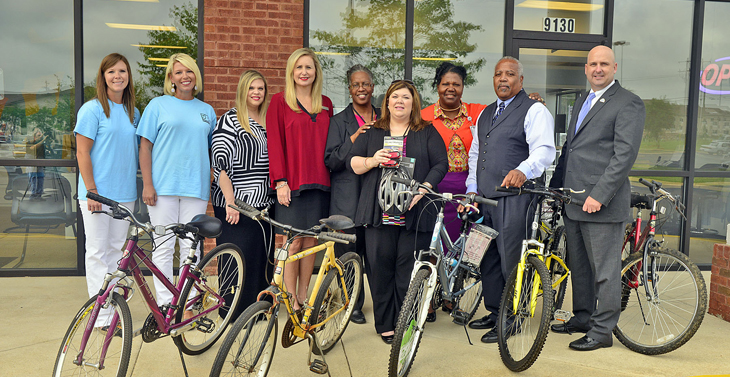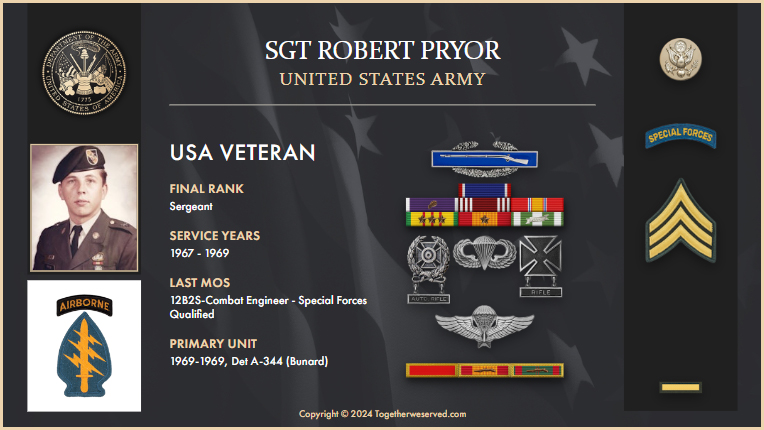U.S. Army Veterans Barry Purnell and Larry Anderson overcame homelessness only to face another challenge: a long, complicated commute to work in rural Alabama.
For Anderson, the bus ride and walk to his car-detailing job took 50 minutes. Purnell’s commute to his moving and storage job often stretched to several hours if the transit hub was closed before or after his shift.
This situation concerned Kevin K. Sellers, the community employment coordinator (CEC) for the Central Alabama Veterans Health Care System (CAVHCS). He works to find competitive employment for Veterans in Tuskegee, Montgomery and other nearby towns so they can sustain permanent housing.
Sellers knew from experience that the shortage of affordable, reliable transportation is a common barrier facing Veterans looking for work. “My thought was: ‘What could I do to ease these and other area Veterans’ daily commutes?’,” said Sellers.
Bike-Rolling a Shorter Commute
From this notion sprouted “Good Wheels for Veterans,” a bike donation drive organized by the CAVHCS and Goodwill Industries of Central Alabama. Starting on May 2, 2016, and continuing through the end of the month, donations of new and lightly used bikes are accepted at Goodwill sites around the River Region for distribution to Veterans seeking transportation to and from work.
Among the first to receive a donated bike, Purnell said he looks forward to a faster, more fun ride to work. “This will cut down my commute tremendously,” he said. “I’ll use it to ride down to the market, too. It will be extremely helpful.”
In addition to cycling to work, Anderson said he’ll use his bike to get to the grocery store and pay his bills. “I’m also going to use it to find a second job,” he added.
As the Wheels Turned
It was eye-opening to realize the centrality of transportation in helping Veterans sustain permanent housing after homelessness, said Shay Hicks, Goodwill’s program director. She learned of the transportation need while serving on the Central Alabama Veterans Employment Council, developed and chaired by Sellers. The council convenes community organizations that can reduce barriers to employment for Veterans. Hicks invited Sellers to her office for a brainstorming session to think of ways to remedy the transportation problem. The bike drive was born.
“Montgomery has a great bus system,” Hicks said, “but what we encounter from employers and clients alike is it does not run in the evening. And a lot of jobs are of course available at night. And so there’s a huge gap in services.” Bikes, she said, are a cost-effective way to fill the breach.
Cycling Donations
Goodwill is accepting bike donations Monday through Saturday through May 31, 2016, at River Region donation sites in the counties of Montgomery and Autauga. The bikes are then brought to Goodwill’s central office and readied for VA pickup and distribution.
The program is a natural extension of Goodwill’s existing work with VA to employ Veterans who have recently transitioned out of homelessness with help of programs like Housing and Urban Development-VA Supportive Housing and VA’s Homeless Veterans Community Employment Services, which support the work of CECs like Sellers.
Hicks said the goal is to collect at least 50 bikes but the number accepted is “endless.” VA’s collaborating partner Military Outreach USA has secured funding to buy helmets for a significant number of bike recipients. The real estate and management firm Aronov lent CAVHCS some facility space to store donated bikes until they can be collected.
Hicks said that she hoped a successful drive in the Montgomery area will inspire other Goodwill locations throughout the nation to dedicate a month to the collection and distribution of bikes to homeless or formerly homeless Veterans.
This is a shining example of the way that community partners contribute to the goal of ending homelessness among Veterans, said Paul Bockelman, interim director of the CAVHCS.
“By teaming with us,” he added, “Goodwill is providing transportation for Veterans who have limited opportunities to get to work and around town. It’s two wheels toward a fresh start.”
Get More Information
- Visit VA’s website to learn about employment initiatives and other programs for Veterans exiting homelessness.
- Refer Veterans who are homeless or at imminent risk of becoming homeless to their local VA Medical Center, where VA staff are ready to assist, or urge them to call 1-877-4AID-VET (1-877-424-3838).
About the Author: Carma Heitzmann, Ph.D., is director of VA’s Homeless Veteran Community Employment Services program, which works to mitigate or prevent homelessness by ensuring that a range of employment-related services are accessible to Veterans who are unemployed, underemployed or at risk of becoming unemployed.
Topics in this story
More Stories
Summer can be a joyful time of year, but some outdoor activities can be hard for some Veterans. In this guest post, former VA Secretary Bob McDonald shares resources and plans to navigate summer activities.
"A CAPITOL FOURTH" airs on PBS Thursday, July 4, 2024 from 8:00 to 9:30 p.m. E.T.
The following is an account from Army Veteran Robert Pryor on how he was able to find and reconnect with the pilot who saved his life in Vietnam.








